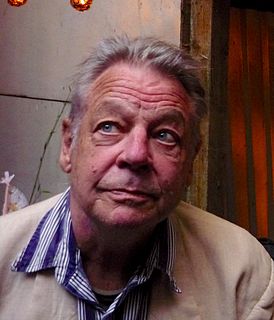Related Research Articles

This article focuses on poetry from the United Kingdom written in the English language. The article does not cover poetry from other countries where the English language is spoken, including Republican Ireland after December 1922.
"The British Poetry Revival" is the general name given to a loose poetry movement in Britain that took place in the 1960s and 1970s. The revival was a modernist-inspired reaction to the Movement's more conservative approach to British poetry. The poets included an older generation - Bob Cobbing, Paula Claire, Tom Raworth, Eric Mottram, Jeff Nuttall, Andrew Crozier, Lee Harwood, Allen Fisher, Iain Sinclair—and a younger generation: Paul Buck, Bill Griffiths, John Hall, John James, Gilbert Adair, Lawrence Upton, Peter Finch, Ulli Freer, Ken Edwards, Robert Gavin Hampson, Gavin Selerie, Frances Presley, Elaine Randell, Robert Sheppard, Adrian Clarke, Clive Fencott, Maggie O'Sullivan, Cris Cheek, Tony Lopez and Denise Riley.
Gael Turnbull was a Scottish poet who was an important figure in the British Poetry Revival of the 1960s and 1970s.
Jeremy Halvard Prynne is a British poet closely associated with the British Poetry Revival.
Andrew Thomas Knights Crozier was a poet associated with the British Poetry Revival.
Barry MacSweeney was an English poet and journalist. His organizing work contributed to the British Poetry Revival.
Denise Riley is an English poet and philosopher.

Peter Robinson is a British poet born in Salford, Lancashire.

Harry Guest was a British poet born in Wales.

Stephen Rodefer was an American poet and painter who lived in Paris and London. Born in Bellaire, Ohio, he knew many of the early beat and Black Mountain poets, including Allen Ginsberg, Gregory Corso, Charles Olson, and Robert Creeley. Rodefer was one of the original Language poets and taught widely, including: UNM, SUNY Buffalo, UC Berkeley, UC San Diego, San Francisco State, and the American University of Paris. Rodefer was the first American poet to be offered a Fellowship at Cambridge University.
Ken Edwards is a poet, editor, writer and musician who has lived in England since 1968. He is associated with The British Poetry Revival.
Richard Berengarten is a British poet, translator and editor. Having lived in Italy, Greece, the US and the former Yugoslavia, his perspectives as a poet combine English, French, Mediterranean, Jewish, Slavic, American and Oriental influences. His subjects deal with historical and political material, with inner worlds, relationships and everyday life. His work is marked by its multicultural frames of reference, depth of themes, and variety of form. In the 1970s, he founded and ran the international Cambridge Poetry Festival. He has been an important presence in contemporary poetry for the past 40 years, and his work has been translated into more than 90 languages.
Camille Martin is a Canadian poet and collage artist. After residing in New Orleans for fourteen years, in 2005 she moved to Toronto following Hurricane Katrina.
Drew Milne is a contemporary British poet and academic.
Veronica Elizabeth Marian Forrest Thomson was a poet and a critical theorist brought up in Scotland. Her 1978 critical study Poetic Artifice: A Theory of Twentieth-Century Poetry was reissued in 2016.
John Muckle is a British writer who has published fiction, poetry and literary criticism.
Roger Francis Langley was an English poet and diarist. During his life, he was loosely affiliated with the Cambridge poetry scene.
David Chaloner was an English poet associated with the British Poetry Revival, and a prominent British designer.
Robert Sheppard is British poet and critic. He is at the forefront of the movement sometimes called "linguistically innovative poetry".
Robert Gavin Hampson FEA FRSA is a British poet and academic. Hampson was born and raised in Liverpool, before studying in London and Toronto and finally settling in London. Hampson taught at Royal Holloway, University of London, from 1973, and was Professor of Modern Literature there from 2000. From 2016 to 2019, he was Distinguished Teaching and Research Fellow in the Department of English at Royal Holloway. He is currently Research Fellow at the Institute for English Studies, University of London; Emeritus Professor at Royal Holloway; and Visiting Professor at the University of Northumbria. He remains an active member of the Poetics Research Centre and the Centre for GeoHumanities at Royal Holloway. For his contributions to two distinct areas – contemporary innovative poetry and the international study of Joseph Conrad – he is, without a shadow of a doubt, a 'legend'.
References
- ↑ Peter Ackroyd, “A future for English Poetry”, Spectator (16 October 1976): 25.
- ↑ Salt Publishing. Archived 2011-08-17 at the Wayback Machine
- ↑ British Electronic Poetry Centre, Southampton University.
- ↑ Keith Tuma (ed.), Anthology of Twentieth-Century British & Irish Poetry. New York: Oxford University Press, 2001, 790.
- ↑ Plymouth University Staff Directory.
- ↑ Arts Council, England. Archived 2011-08-01 at the UK Government Web Archive
- ↑ Archive of the Now, author page.
- ↑ Only More So, University of New Orleans Press.